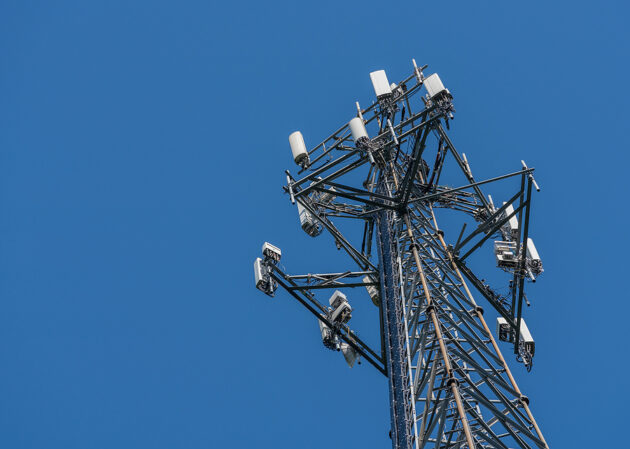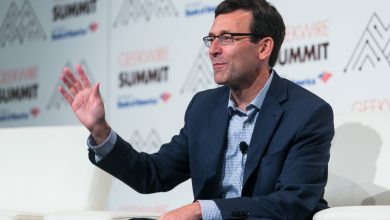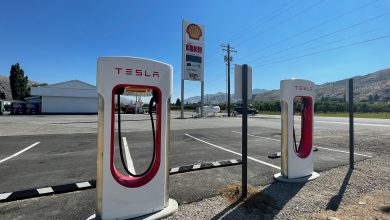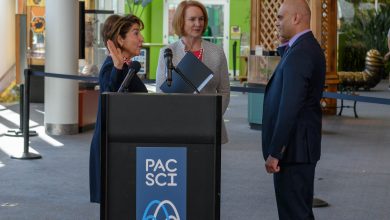How Washington state’s potential federal infrastructure largess could spark a broadband fight

Rep. Drew Hansen, a longtime advocate for increasing the reach and affordability of broadband in Washington state, found himself both pleased and a little concerned about the hundreds of millions in broadband funding approved this week by the U.S Senate.
He was pleased because if passed by the House of Representatives, the state likely will see between $100 million and $700 million in federal money to improve its broadband service while lowering its cost — fixing two problems that became glaringly obvious during the pandemic.
But the Bainbridge Island Democrat also sees a potential conflict on the horizon. Hansen, who helped push through legislation that for the first time will allow municipal districts to become direct internet service providers, doesn’t want to see the taxpayer money end up fattening profit margins for private internet service providers.

“Washington state has made it clear our priority is public broadband,” he said. “This is not money that should go into subsidies for private corporations. This should be spent on public broadband.”
This is not a view entirely shared by at least one key official who likely will have some say in the matter.
Russ Elliott, director of the state’s Broadband Office within the Department of Commerce, is also thrilled about the generational opportunity contained within hundreds of millions of dollars to be spent on statewide broadband infrastructure.
Like Hansen, he wants to see cheaper broadband for people who can’t afford it and fast downloads for people who currently have no reliable internet access at all.
But unlike Hansen, he sees private companies as part of the solution — not just a cause of the existing problems.
“Drew and I have talked about this,” Elliott said, acknowledging that the two largely want the same outcome but through different means. “What we need to do — and the private sector has to be a part of this — is to future-proof our broadband infrastructure.
“What we don’t need is to get into an argument of public-versus-private,” he said.
That argument seems likely at this point, though it’s unclear what Hansen or any other lawmaker could do to limit how the state might spend the money.
Currently awaiting a vote in the U.S. House, the broadband funds are part of a $1 trillion infrastructure bill that passed with bipartisan support in the Senate on Tuesday. Among the $550 billion in new federal spending — the legislation also continues some existing programs — the measure would earmark $110 billion for highways and bridges; another $25 billion for airports; $66 billion for Amtrak; and $65 billion to expand high-speed internet nationwide.
It remains unclear when the House will take up the measure for a vote.

The specific amount of Washington’s take hasn’t been set. Under historical, population-based federal disbursement formulas, the state could see as much as $700 million, perhaps even $1 billion. At a minimum, each state will see $100 million under the existing guidelines.
But what the guidelines don’t determine is whether or not that money can be used to subsidize high-speed Comcast broadband for a family below the poverty line in Seattle, or whether it can be spent to expand Kitsap County’s existing public broadband effort. The current language of the legislation appears to allow both.
Hansen has said private internet providers in some cases are why the state has such significant broadband inequities. For example, a King County study completed in 2020 found that 80% of King County residents have sufficient internet and the remaining 20% are lacking adequate even basic service, meaning they have slow upload speeds — or none at all — or the service is cost-prohibitive.
The reason, Hansen and other public broadband advocates say, is that the for-profit companies culled all of the profitable low-hanging fruit and left rural and low-income populations high-and-dry.
In other words, advocates say, the private companies had their chances.
“The federal government can — and should — put strings on that money,” Hansen said. He said there are forms of private-public partnerships that could work if the state is careful about how the federal money is spent. “I don’t want to see this as a profit-center for private internet companies.”
Elliott countered that not all private service providers are cut from the same cloth. “I appreciate Drew’s point but there are smaller private companies who are doing great work in the rural parts of the state,” he said. “You would do rural Washington a great disservice by cutting those companies out.”
He said the 2009 infrastructure package approved by the Obama administration under the American Recovery and Re-investment Act funded both public and private projects and was considered a success. Washington received approximately $150 million in funds from the act.
Should the new money come to Washington, Elliott said it must allow a public-private partnership to make quicker work of providing access and equity for the state’s underserved population. “We need both public and private sectors involved to make this happen fast. It needs to.”
Conclusion: So above is the How Washington state’s potential federal infrastructure largess could spark a broadband fight article. Hopefully with this article you can help you in life, always follow and read our good articles on the website: Ngoinhanho101.com





